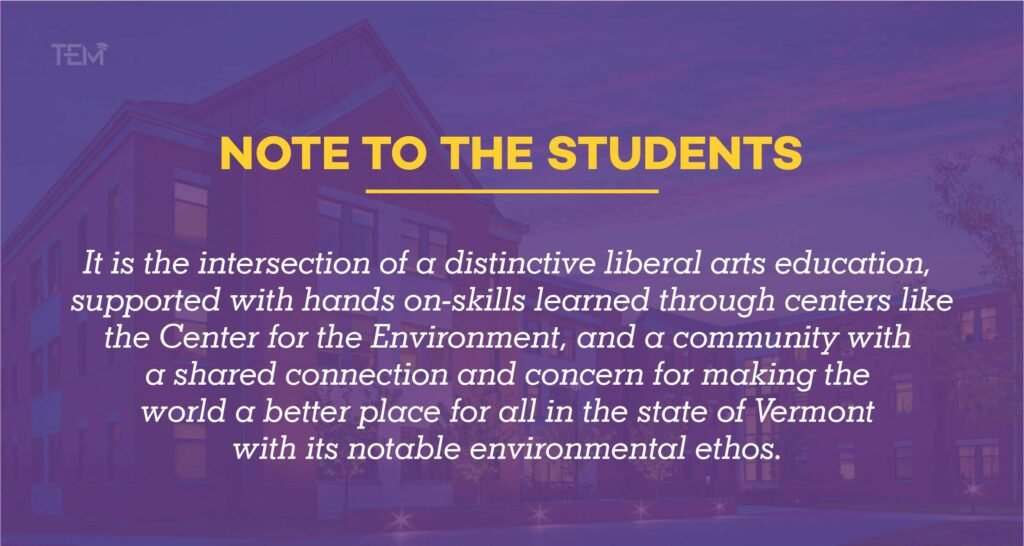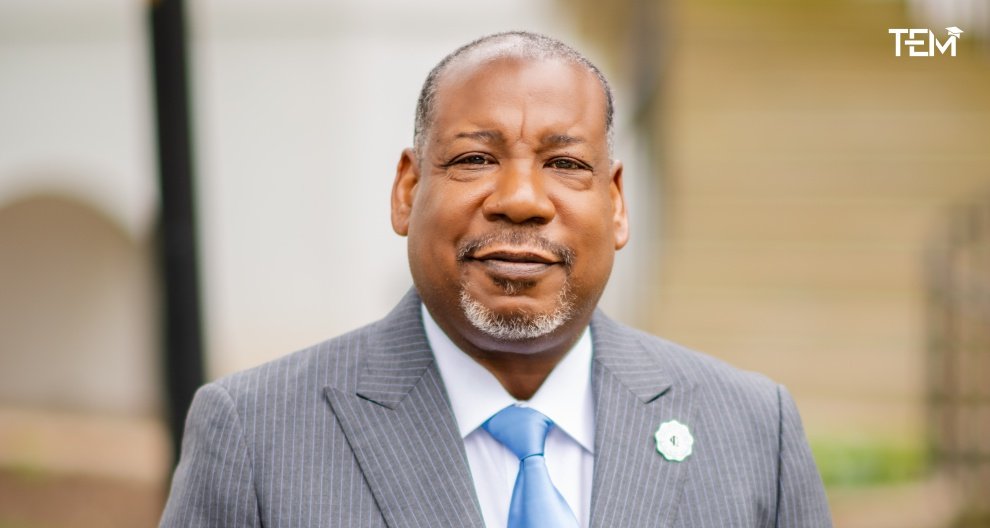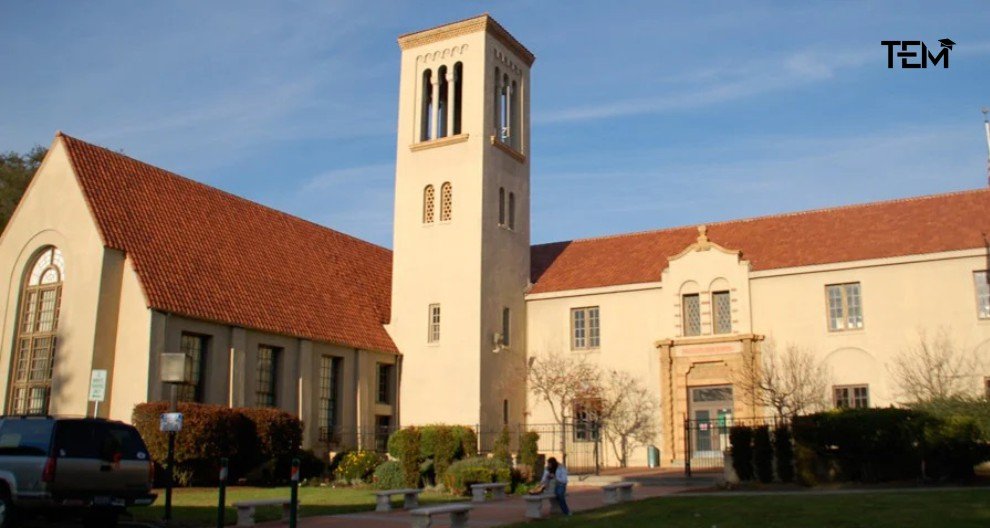Setting an example for other institutions before it is too late for the planet in this era of environmental degradation and global warming, Saint Michael’s College in Vermont, with its Center for the Environment has created a culture that supports and promotes sustainability and provides opportunities for student from all majors to pursue their passion for it.
Commitment to Social Justice and Sustainability
Saint Michael’s College was founded by immigrant French Edmundite priests in 1904. Saint Michael’s and the Edmundites historically have been deeply invested in social justice—from educating the children of immigrants, to working among African Americans from the mid-20th century; and now with a similar practical focus and action through the Center for the Environment, committing to sustainability.
The College follows the great Catholic intellectual tradition and principles of social justice and compassion. It is a selective, fully residential Catholic college in Vermont’s beautiful Green Mountains. Saint Michael’s College offers internationally recognized liberal arts education near Burlington, one of the country’s best college towns. Students of the college grow intellectually, socially, and morally. They are taught to be responsible for themselves, each other, and the world.
In 2004, the college magazine featured Kristyn Achilich—presently the Director of Center for the Environment and the Farm Program — as an early exemplary beneficiary of expanding and vibrant research culture then emerging at Saint Michael’s during her student days at the College. Since returning to her alma mater in 2015, Achilich oversees the campus Farm and its related academic programs, while teaching environmental education, food systems, and agriculture studies. She has been leading these ‘engaged courses’ and taking advantage of the farm and the natural surrounding area as field laboratories.
After graduating from Saint Michael’s College, she worked with the outdoor sports industry where she discovered her passion in the field of education. Kristyn returned to the College to formally pursue a career as an educator. She pursued her M.Ed. and simultaneously taught high school science in Vermont and New Hampshire. Soon, she completed her second master’s degree from the University of Vermont. Kristyn acquired skills in system thinking and food systems and at the same time transitioned from the lab to fields and farms and began teaching college students.
“I quickly brought my two passions together—science education and literacy and outdoor experiential learning,” says Achilich
She now has been an educator for more than 10 years. She has also gained experience in entrepreneurship, and topics from philosophy to financial sustainability and growth programs, leadership, writing, editing, and marketing. She also has what she calls “a reflective growth mindset” toward the institution. Recently Achilich has advocated expansion of the campus farm for the students.
Vibrant Campus Life
Saint Michael’s College offers a wide variety of courses for both major and minor students, which includes arts, commerce, sciences, literature, mathematics, medicine, theatre, music, environmental studies, and more. The most popular majors at Saint Michael’s College include business, management, marketing, social sciences, biological and biomedical sciences, psychology, and natural resources conservation. The student to faculty ratio at the college is 11:1 and it has a majority of its classes with fewer than 20 students.
Students at Saint Michael’s live amid the beautiful scenic beauty of Vermont on a 440-acre campus and natural area with trails and wetlands. The College’s purposeful resource management through the Center for the Environment gets students involved even beyond that beautiful campus, however, in the wider community and surrounding waterways and wilderness areas. Moreover, arts installations, films, and panel discussions regularly explore environmental themes on campus and beyond.
Cross-Disciplinary Education
Saint Michael’s College understands the role of youth in devising a sustainable future. The Center for the Environment teaches its students to be environmentally responsible citizens and leaders of tomorrow. It recognizes that the fortunes of future generations depend on policies, businesses, and initiatives that are directed toward the preservation of the planet, its resources, and the environment. Choosing sustainable alternatives now can slow the effects of climate change, for a brighter future.
The leaders at Saint Michael’s, by creating the Center for the Environment, developed a place where students from any field of study could find a home. Students from different fields can gain knowledge on farming by working on the in-campus farm. Furthermore, political science, history, or philosophy students at the liberal arts college can prepare for law studies through a special relationship with Vermont Law School and its environmental law concentration.
Ethos of Service
Saint Michael’s College prepares its students to think and act critically and creatively to tackle the issues of the modern world as environmental leaders. Its culture of sustainability on campus has evolved as a legacy for future generations.
From students’ first arrival on campus, the College emphasizes an ethos of serving others in their academic and career paths. It becomes a primary motivator for numerous active participants at the College. After leaving, the students feel the urgency and prioritize activities that serve the planet as well as those who inhabit it.
Communal Harmony
Beyond sharing campus farm produce with local food shelves, students operate a public farm stand with proceeds being implemented in good local causes. The College is home to various environmentally-conscious student clubs in the community which include Green Up, Food for Thought, The Fair Trade Committee, and Divestment Campaign. Community youth groups have also worked in coordination with the College — The Natural Area of the college has had a major upgrade in recent years with local youth taking part in projects during the summer..
Furthermore, various high school summer programs along with Vermont’s Established Program to Stimulate Competitive Research (EPSCoR) promote water quality of lakes and streams. Saint Michael’s College is an active partner of the Vermont EPSCoR that helps build the state’s capacity for scientific research and trains a diverse workforce of science, technology, engineering, and mathematics professionals.
Continuous Pursuit of Education
When the pandemic hit, all indoor student activities at the college halted and classes immediately switched to an online mode. Organized work on environmental issues continued online, without any interruptions, and students were still able to pursue their passions through the Center for the Environment, by continuing safe and distanced outdoor work in the Farm and Natural Area.
Affordable Education for Everyone
Affordability figures prominently into any student’s decision about a college to attend. Recognizing this, Saint Michael’s College provides students with generous scholarships, which include merit-based scholarships based on academic achievements. Book Award Scholarships are linked to the demonstration of strong social conscience, including environmental activism. The college also offers nomination-based scholarships, endowed and supported scholarships, and military scholarships.
Over 90 percent of students at Saint Michael’s College receive financial aid, including the full range of federal and subsidized loans. A hundred percent of admitted students are automatically considered for merit-based scholarships. Alongside affordable education, the college also focuses on helping students secure a decent career after graduation. The Career Education and Alumni Engagement Center connect students to potential employment opportunities in ‘Green’ and sustainable businesses.

Read Full Magazine:- The 10 Revolutionary Green Schools, 2021.


